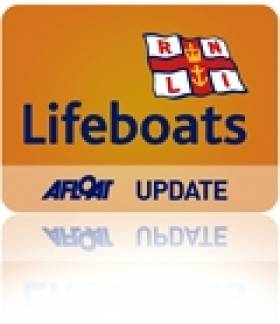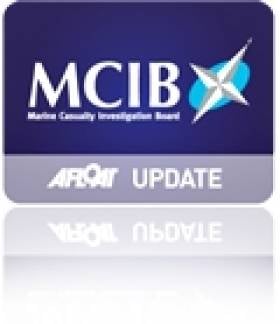Displaying items by tag: loug derg
Lough Derg Lifeboat Investigates Drifting Dinghy
#RNLI - Lough Derg RNLI's lifeboat launched on Sunday 1 June to investigate reports of a dinghy adrift off Parker's Point on the Clare shore.
At 6.35pm Valentia Coast Guard requested Lough Derg RNLI to investigate reports of a dinghy adrift in open water in the direction of Meelik Bay.
The lifeboat launched three minutes later with helm Eleanor Hooker and crew Ger Egan and Liam Knight on board. Winds were south-westerly Force 3 to 4 and visibility was fair to good, with frequent line squalls.
Coastguard staff gave the lifeboat crew the co-ordinates at which the dinghy was seen, and a description of the boat. The lifeboat reached the location at 7pm and its crew calculated the drift of the dinghy given its size and the wind direction.
On the shore where the dinghy would have landed, a remote location, the RNLI crew could detect an oar being raised and lowered above the reeds, and went to investigate.
It was soon discovered that a local family of five a fishing trip had seen the dinghy and had towed it to shore, where they safely moored it up. The dinghy did not have an engine and there was no evidence of it having been occupied.
Reporting these findings to Valentia Coast Guard, the lifeboat was stood down and returned to station. Later, the owner of the dinghy made contact with Valentia explaining that his tender had broken free from his cruiser in rough weather earlier in the day.
Lough Derg RNLI deputy launching authority Pat Garland said: "A small craft adrift in the middle of the lake has implications other than the boat might have slipped its moorings, which, thankfully, is the case today."
He commended the boat users on the lake for their "diligence on their watch and for reporting the dinghy".
In another false alarm, Donaghadee’s all-weather Lifeboat Saxon launched around 8.00pm on Saturday 31 May after reports of an object in the water off the coast of the Copeland Islands in Co Down.
A witness described what appeared to be people in the water, and the lifeboat was on scene within 15 minutes - to find nothing more than a bunch of helium-filled party balloons that had come down in the sea.
Lifeboat coxswain Philip McNamara said: "While this was a preventative operation, the lifeboat volunteers prefer to attend at an early stage to avoid any risk to life. An object in the water can be a danger to shipping.”
The same day saw Courtown RNLI's volunteer lifeboat launch to the aid of a small angling boat that had suffered engine failure.
However, the launch was delayed by a car and boat trailer that had been parked across the launching winch area for the lifeboat.
Thankfully the lifeboat – crewed by Glen Deacon, Fergus Slevin and Robert Ireton Jr – was launched by other means and was quickly alongside the casualty, towing the boat back into harbour.
Courtown lifeboat operations Manager Sam Kennedy said: "We urge people not to park across the launching area or to block up the slipway in Courtown. We were lucky that this was not a more serious incident and the delay didn't cause loss of life."
MCIB Publish Fatal Powerboat Accident Report on Lough Derg
#powerboat accident – The Marine Casualty Investigation Board (MCIB) has released details of a fatal powerboat accident near Garrykennedy on Lough Derg from 2012.
On the morning of 2nd August 2012, Mr Patrick Danaher purchased fuel for his powerboat at New Line, Killaloe.
That evening, the boat was seen floating partially submerged and overturned with the bow out of the water near Youghal Bay, Lough Derg. Afloat.ie's news report at the time of the capsize is here.
The boat had struck submerged rocks at high speed and suffered major damage to the outdrive allowing the free ingress of water into the boat.
The boat was recovered that evening and Mr Danaher's body was recovered from the lake the following day.
In its conclusions the MCIB said the boat and its machinery were in good condition and did not contribute to the incident.
The displacement of the outdrive port side pivot pin was not significant in the incident.
At the time of the incident the boat was being driven at high speed close to the shoreline.
The post mortem results show that the ethanol levels in Mr Danaher's blood and urine were within the toxic range. However, the influence of alcohol may have affected his ability to:
• effectively apply his local knowledge and experience
• make rational decisions in respect of the speed of the boat and its course
• recognise the danger of driving the boat in such close proximity to the small headland and the submerged rocks adjacent to the headland.
Mr Danaher did bring the control lever to the neutral position and shut down the engine at the time of the incident.
The full report is downloadable here as a PDF file.































































